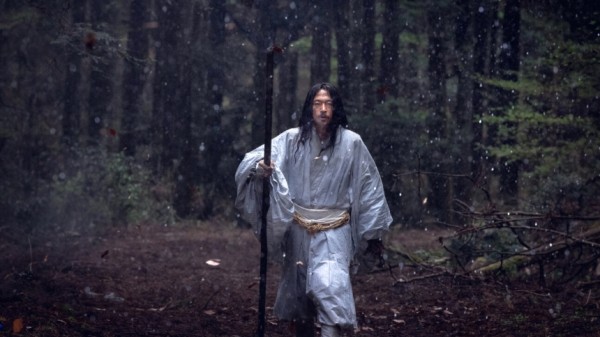 ROSUKE KUBOZUKA IN TRANSCENDING DIMENSIONS TOSHIOKI TOYODA: TRANSCENDING DIMENSIONS (2025) New York Asian Film Festival 2025A laughing monk, a mountain mystic, a hit man, and a dead lady
ROSUKE KUBOZUKA IN TRANSCENDING DIMENSIONS TOSHIOKI TOYODA: TRANSCENDING DIMENSIONS (2025) New York Asian Film Festival 2025A laughing monk, a mountain mystic, a hit man, and a dead ladyDespite the claims of uniqueness for Toyoda's return to feature-filmmaking after a seven-year hiatus, and the warning that one shouldn't begin sampling him with it (which I have done), there was something stylistically familiar about
Transcending Dimensions from
Kill Bill. In fact the ceremonial quality and mix of spiritual, martial arts, and gangster elements seems to inspire a lot of QT's oeuvre. There is much emphasis on slow, or stately, motion in this new movie and a sectioning or separating of scenes and accompaniment by different designated music, the solemnity broken by a sense of humor or implied existential absurdity. This film finds a way to make spiritual awakening into a flashy show and combine that with parts of an action movie.
Nearly forty minutes transpire before the opening credits. Early on, a woman throws herself under a train. There are several violent clashes, and a shooting. There's an additional element of sci-fi, possibly an influence of Stanley Kubrick's
2001: a Space Odyssey, and kaleidoscopic imagery. Several of the main characters at moments are encased in what looks like a glorious, giant quartz crystal; at one point, a key character is multiplied in a sparkling kaleidoscope. At these times I was reminded of Tarsem Singh's visually exquisite 2006
The Fall.Main characters - also a QT staple - are distinct types, almost like chess pieces. Instead of the pawn, the rook, and the knight, there's the tall blond grinning monk (Chihara Junia), the hit man (Ryuhei Matsuda), and there's the enlightened one, Rosuke (Yôsuke Kubozuka). Theodoor Steen reports from an interview with Toyoda in his
Screen Anarchy review that there are six "Mt. Resurrection Wolf" short films, under way since 2019, which are the "returning puzzle piece" for the new feature. (Another source calls this feaure the culminationof the Wolf seies.) The short films, Steen reports, allude to matters of government and the media during the covid epidemic, and came at the time of the filmmaker's "infamous" arrest for after his "infamous arrest" (infamous for the arrestors, I assume, not the arrrestee) "for having an antique non-functional gun in his home, an heirloom from his grandparents."
Not much of that makes its way explicitly into the new feature, though one character refers to spirit guidance from the wolf. But there are themes from earlier Toyoda films, Steen explains, especially "the cult leaders vs. criminals theme of
I'm Flash and the theme of isolation to seek transcendence of
Monsters Club." And three is a brief chat about reincarnaton, and whether one believes in it. The ghost lady does (as perhaps she might); the enlightened sage says he "is not there yet."
I wish Steen had said something about Master Hanzo (Chihara Junia), a Shugendō ascetic with otherworldly psychic powers, a tall, grinning long-haired blond monk, since a visit to his glamorously wooded temple garden by a group of men is a major set piece of the film. Here is where Yasu (Masahiro Hihashide), Teppei (Kiyohiko Shibukawa),a man who has lost his way, is instructed to cut off his little finger to guarantee his spiritual dedication and transcend dimensions - a gesture, one thought, usually assigned to yakuza underlings as punishment or proof of loyalty. And there's the bathroom break the frightened Teppei takes, the naked lady "seat warmer" who startles him in th loo, and Shinno's laughing commpletion of the pinky-chopping. There is the other man (an un-robed monk?), Teppei (Kiyohiko Shibukawa) who curses Hanzo as a dangerous quack and refers to him with vulgar expletives, vowing to get him. And there is the assassin, Shinno (Ryuhei Matsuda), who takes direct action against Hanzo, masters one of his tricks, and is given a magical conch shell by him and later returns again to kill him.
A key figure, as it turns out, is Nonoka (Haruka Imou), girlfriend of the missing monk Rosuke (Yosuke Kubozuka). She may or may not be alive, but approaches the assassin Shinno and also denouces Hanzo and strongly suggests that Shinno kill him. They discuss reincarnation. Hanzo appears later to acknowlege Rosuke as the more spiritually spiritual guide. Things are said about Buddhism and about the way seeking Nirana may functioin for a seeker. I won't divulge the complicated finale, which as a Toyoda neophyte, I probaby don't understand anyway.
For some of my details of the characters and cast I'm indebted to the most thorough description of the film I've found in English, a review in
psychocinematography.com, which explains further how the film may relate importantly to the filmaker's several encounters with the law, including an earlier one for drugs in 2005, which influenced his sense of society, of the spiritual and the "Other," his sense of individual "narratives," and the inspirations behind his films. There's a lot there. As a fan of Japanese cinema, one obviously ought to know more about this director. Even if this is starting backwards, it's an interesting beginning.
Transcending Dimensions 次元を超える, 97 mins., has been presented at Nippon Connections and Rotterdam. It was screened for this review as part of the July 11-17, 2005 New York Asian Film Festival.
SCHEDULE:
Saturday July 19, 9:15pm
Film at Lincoln Center
Intro and Q&A with director Toshiaki Toyoda




